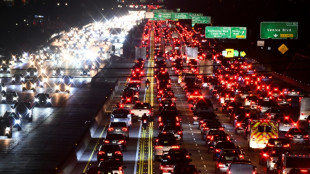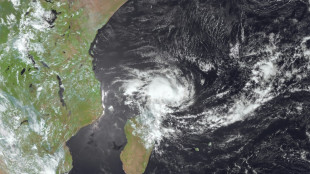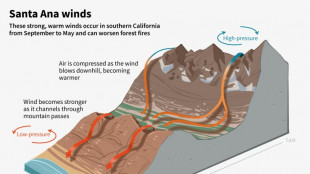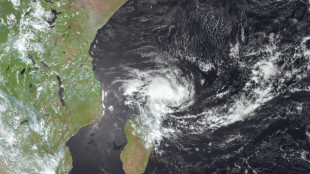
-
 UK economy rebounds but headwinds remain for govt
UK economy rebounds but headwinds remain for govt
-
Rice fields turned into art in northern Thailand

-
 Stocks follow Wall St higher on welcome US inflation data
Stocks follow Wall St higher on welcome US inflation data
-
South Korea's president arrest: what happens next?

-
 Blue Origin's New Glenn rocket blasts off in first launch, reaches orbit
Blue Origin's New Glenn rocket blasts off in first launch, reaches orbit
-
Chinese give guarded welcome to spending subsidies

-
 World Bank plans $20 bn payout for Pakistan over coming decade
World Bank plans $20 bn payout for Pakistan over coming decade
-
Indian Bollywood star Saif Ali Khan stabbed in burglary

-
 Taiwan's TSMC says net profit rose 57% in fourth quarter
Taiwan's TSMC says net profit rose 57% in fourth quarter
-
India achieves 'historic' space docking mission

-
 South Korea's Yoon avoids fresh questioning after dramatic arrest
South Korea's Yoon avoids fresh questioning after dramatic arrest
-
Olympic push for kho kho, India's ancient tag sport

-
 Dangerous Fritz sets up Monfils clash at Australian Open
Dangerous Fritz sets up Monfils clash at Australian Open
-
AFP photographer's search for his mother in the Nazi camps

-
 Life after the unthinkable: Shoah survivors who began again in Israel
Life after the unthinkable: Shoah survivors who began again in Israel
-
Israeli cabinet to vote on Gaza ceasefire deal

-
 Jabeur finds it 'hard to breathe' as asthma flares up in Melbourne
Jabeur finds it 'hard to breathe' as asthma flares up in Melbourne
-
Swiatek powers on as Sinner, Medevedev top men's Melbourne bill

-
 Nintendo rumour mill in overdrive over new Switch
Nintendo rumour mill in overdrive over new Switch
-
Biden warns of Trump 'oligarchy' in dark farewell speech

-
 Superb Swiatek sets up Raducanu showdown at Australian Open
Superb Swiatek sets up Raducanu showdown at Australian Open
-
Asian stocks follow Wall St higher on welcome US inflation data

-
 Toyota arm Hino makes deal to settle emission fraud case
Toyota arm Hino makes deal to settle emission fraud case
-
Fire-wrecked Los Angeles gets a break as winds drop

-
 Superb Swiatek races into third round at Australian Open
Superb Swiatek races into third round at Australian Open
-
Biden warns of dangerous 'oligarchy' in dark farewell speech

-
 Herbicide under US scrutiny over potential Parkinson's link
Herbicide under US scrutiny over potential Parkinson's link
-
South Korea's Yoon to avoid fresh questioning after dramatic arrest

-
 Behind the Gaza deal: a US odd couple and last-minute snags
Behind the Gaza deal: a US odd couple and last-minute snags
-
Noisy racket on Australian Open 'party court' forces match move

-
 AFP strikes deal for France's Mistral AI to use news articles
AFP strikes deal for France's Mistral AI to use news articles
-
'Sensational' Arsenal back in title race: Arteta

-
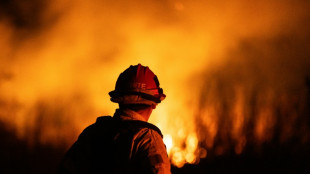 Survivors count the mental cost of Los Angeles fires
Survivors count the mental cost of Los Angeles fires
-
Arsenal reignite Premier League title charge as Isak stars again

-
 Thousands across Gaza celebrate ceasefire deal
Thousands across Gaza celebrate ceasefire deal
-
Postecoglou slams 'nowhere near good enough' Spurs after Arsenal defeat

-
 Moyes 'under no illusions' after defeat on Everton return
Moyes 'under no illusions' after defeat on Everton return
-
Arsenal reignite Premier League title hopes as Isak stars again

-
 Yamal drives dominant Barca past Betis into Copa del Rey quarters
Yamal drives dominant Barca past Betis into Copa del Rey quarters
-
Arsenal fightback sinks Spurs to ignite title bid

-
 Qatar, US announce Gaza truce, hostage release deal
Qatar, US announce Gaza truce, hostage release deal
-
US consumer inflation rises in December but underlying pressures ease

-
 McGregor accused of sexual assault in civil suit
McGregor accused of sexual assault in civil suit
-
Inter's title defence slowed by draw with spirited Bologna

-
 Isak fires Newcastle into Premier League top four, Moyes misery
Isak fires Newcastle into Premier League top four, Moyes misery
-
Sane hits brace as Bayern thump Hoffenheim

-
 Aston Villa ruin Moyes' Everton return
Aston Villa ruin Moyes' Everton return
-
Norman replaced as CEO of LIV Golf

-
 SpaceX delays latest Starship megarocket test to Thursday
SpaceX delays latest Starship megarocket test to Thursday
-
Quake-stricken Vanuatu heads to polls in snap election


Climate change worsening heatwaves, air quality: UN
Climate change is driving more intense and more frequent heatwaves, which in turn generate a "witch's brew" of pollutants, threatening the health of humans and other living things, the UN warned Wednesday.
The wildfire smoke recently suffocating cities from Athens to New York may be the most visible sign of air pollution brought on by heat waves.
But extreme heat can also induce a whole host of other chemical processes that are hazardous for human health, the United Nations' World Meteorological Organization said in its annual Air Quality and Climate Bulletin.
"Heatwaves worsen air quality, with knock-on effects on human health, ecosystems, agriculture and indeed our daily lives," WMO chief Petteri Taalas said in a statement.
A recent study by the Energy Policy Institute at the University of Chicago (EPIC) indicated that fine particulate air pollution from things like vehicle and industrial emissions but also sand and wildfires, is "the greatest external threat to public health" worldwide.
Taalas stressed that "climate change and air quality cannot be treated separately".
"They go hand-in-hand and must be tackled together to break this vicious cycle."
- 'More extreme' -
While Wednesday's report was based on 2022 data, Taalas cautioned that in terms of temperatures, "what we are witnessing in 2023 is even more extreme".
On Wednesday, the European Union's Copernicus Climate Change Service said the Earth had just had its hottest three months on record, with last July the hottest month ever recorded, followed by August and that 2023 was on track to become the hottest year on record.
That is bad news for air quality levels.
"Air quality and climate are interconnected because the chemical species that affect both are linked, because the substances responsible for climate change and for the degradation of air quality are often emitted by the same sources, and because changes in one inevitably cause changes in the other," WMO said.
It pointed for instance to how the combustion of fossil fuels emits carbon dioxide and nitrogen oxide into the atmosphere, which are not only heat-trapping greenhouse gases but can lead to the formation of pollutants like ozone and nitrate aerosols.
Researchers meanwhile widely agree that climate change is causing more intense and more frequent heatwaves, and that this in turn is leading to a growing risk of more severe wildfires, WMO said.
- 'Closely linked' -
"Heatwaves and wildfires are closely linked," said Lorenzo Labrador, a WMO researcher at the Global Atmosphere Watch network which compiled Wednesday's Bulletin.
"Smoke from wildfires contains a witch's brew of chemicals that affects not only air quality and health, but also damages plants, ecosystems and crops – and leads to more carbon emissions and so more greenhouse gases in the atmosphere," he said in the statement.
The 2022 data detailed in the report showed how heatwaves last year triggered wildfires in the Northwestern United States, leading to unhealthy air.
Soaring temperatures in Europe, accompanied by unusually high amounts of desert dust reaching the continent, meanwhile led to increased concentrations of both particulate matter and ground-level ozone pollution, it said.
While high-altitude, or stratospheric ozone provides humans with vital protection from harmful the ultra-violet rays of the sun, ozone close to the Earth's surface is harmful to human health.
It also reduces crop yield, with ozone-induced losses averaging 4.4-12.4 percent globally for staple food crops, and wheat and soybean losses as high as 15-30 percent in parts of India and China.
A.Mahlangu--AMWN
